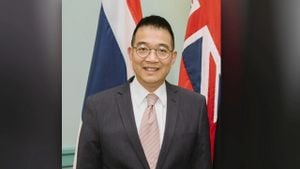Taksin Shinawatra, the former Prime Minister of Thailand, marked his return to the southern province of Narathiwat on February 23, 2024, as he seeks to revive peace talks aimed at resolving the long-standing conflict in the region. This visit as the advisor to the ASEAN chair has illuminated the pressing issues faced by communities at the southern border, which have suffered from decades of violence and unrest.
During the visit, Taksin expressed intentions to engage meaningfully with local stakeholders to establish effective channels of communication and cooperation.
"We must stop breathing for a moment and reflect on the last 20 years, to see how we can truly help those who want to live peacefully," he asserted, highlighting the importance of dialogue and collaboration between the government and the local populace. His statements echo sentiments shared by those advocating for more inclusive governance and reconciliation.
Accompanied by high-profile officials—including Deputy Prime Minister and Minister of Defense Phumtham Wechayachai and Minister of Justice Tawai Sodsong—Taksin also paid homage at local Buddhist temples, underscoring his commitment to both cultural and community engagement.
Taksin's visit is not merely ceremonial but signifies a renewed effort to tackle the complexity of the grievances faced by the southern provinces, where conflict has persisted, manifesting as various forms of violence and sectarian tensions. Locals have been eager for more substantial action from the government, challenging the long-held perception of neglect by central authorities.
Political analysts like Ekgrin Tuan-siri argue, "The hope among the population is to initiate effective peace talks," going on to assert the necessity for government transparency and accountability to its people. The former Prime Minister, who previously addressed similar issues during his tenure, is viewed as both a controversial and pivotal figure capable of bridging divides.
The pervasive atmosphere surrounding the visit is fraught with caution. Many who have lived through the cycles of promises and subsequent disappointments remain skeptical about whether the government will truly implement change. Participation from local voices, especially those who represent the Muslims and Buddhist communities alike, is seen as pivotal to any lasting solution.
Taksin, acknowledging the legacy of suffering associated with the region's history, offered heartfelt apologies for the 2004 Tak Bai incident, which resulted in substantial loss of life during government crackdowns on protests. "The government's responsibility is to advance justice and the peace process," he noted during gatherings with community members, laying the groundwork for potential healing.
Despite his history entwined with the region's political struggles, there exists palpable hope among various factions for genuine action. The aspirations voiced include establishing platforms for dialogue and leveraging regional partners to engage constructively with rebellious elements.
Taksin's alignment with local leadership offers new momentum. Many view his involvement as offering potential for progress, largely due to his family's longstanding connection to the region and previous efforts for peace. Political analyst Tuan-Siri elaborated, "There's momentum now, more than there was previously, and Taksin's push may break the stasis we've seen over the last two decades."
Engagement will also be necessary from regional players, especially from neighboring Malaysia. Anuwar Ibrahim, the current Malaysian Prime Minister, has been equally enthusiastic about fostering peace and has shown support for initiatives targeting the southern provinces. Cooperation could see the return of individuals previously affiliated with separatist movements, provisionally addressing grievances.
On the grassroots level, community members have expressed wariness but willingness to participate in any future initiatives, should they see authentic intentions from the government. This includes calls for establishing frameworks for community input within local governance, as echoed during discussions at local community centers. Participants urged for constructive participation to shift the dialogue toward reconciliation rather than solely enforcement.
One community elder poignantly added, "After years of silence, we mustn’t turn our backs on these chances for peace. They can’t just be words anymore; they need to mean something to the people here. We want to feel safe and truly engaged."
While the current government led by the Pheu Thai Party champions these initiatives, the groundwork needs bolstering from both sides of the political spectrum. Histories of distrust must be addressed, and successful negotiation requires community ambassadors who embody the aspirations of both Buddhists and Muslims alike.
It's clear the stakes remain high. Both the government and stakeholders from southern Thailand must navigate these complex dynamics as they hope to clasp the fragile path to peace. Insights from analysts reflect the cautious optimism felt by many: with Taksin pivoting to prioritize dialogue, and the people advocating for consistent involvement, the flickering flame of peace efforts might finally illuminate the troubled terrain of southern Thailand.



